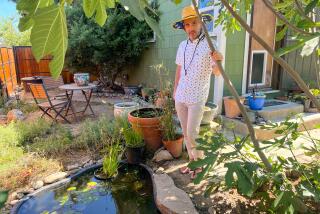Gardening : Nature’s Own Water-Tight Designs : Cactuses: Arboretum hosts show and sale of plants that thrive on a water diet.
- Share via
Plants custom-designed by nature for water conservation will be available at the 25th annual show and sale sponsored by the Cactus and Succulent Society of America at the Arboretum, June 29 and 30 and July 1.
Specimens of silver cactus and succulents from every continent except Antarctica will mark the silver anniversary of the oldest continuous Cacti and Succulent Show in the United States. They will also illustrate leaf modifications that conserve water within plant tissue.
The silver-toned plants include those with waxy coatings that slow transpiration, or water loss, through the leaf surface. A newly introduced example from Asia is Orostachys ‘Warenge’ from Japan, whose waxy variegated leaves form a smooth rosette.
Another modification of the leaf’s upper epidermal layer results in woolly silvery hairs that lower leaf tissue temperature by providing insulation from the sun and reducing the effect of wind.
One popular hirsute group is the North American Mammillaria from Mexico. The abundant soft white hair of M. hahniana Superba, called the “old lady” cactus, and M. plumosa , called the “feather cactus,” beg for a pat but not all members of the family are so benign, warns Joe Clements, curator of the Huntington Desert Garden and show manager. “No one who handles M. senilis , ‘the old man cactus,’ ” Clements says, “will forget the terrible hooks that seem to embed themselves forever.”
South American plants also have duplicitous hairy coverings. A few, such as the small fuzzy balls of the Bolivian Rebutia muscula named ‘Mousy’ have an innocuous covering that is pettable, but others, such as Cleistocactus strausii ‘Silver Touch’ and its forms have insidious spines.
Semperviviums from Europe protect themselves from summer sun and winter snow by a hairy vesture of their waxy leaves. From the southern part of that continent, the “spider web” plant, S. arachnoideum , has a showy tangle of silvery hair.
From Africa comes the contorted stems of the rare Anacampseros albissima , covered with minute brilliant-white scale-like leaves. And, from Australia, there is A. australis.
Entrance to the sale is free. The Arboretum, at 301 South Baldwin Ave. in Arcadia, can be reached off the Baldwin exit south from the Foothills (210) freeway. Admission is $3 for adults, $1.50 for seniors 62 years and older and for students, 75 cents for children 6 and older, with no charge for children 5 and under.






